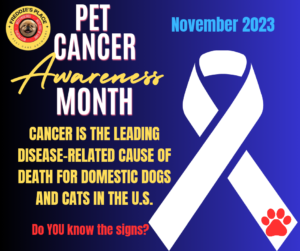 November is National Pet Cancer Awareness Month
November is National Pet Cancer Awareness Month
November is a busy month on the Pet Calendar with National Senior Pet Awareness Month, Pet Diabetes Month, National Shelter and Rescue Appreciation Week, National Cook for Your Pets Day, International Groomer Appreciation Day, National Shop with your Dog Day, National Slobber Appreciation Day, National Black Cat Day, Thankful for my Dog Day, and World Pet Day all crammed into a month with Thanksgiving and Black Friday waiting at the end. However, there is no more important calendar event in November, with more live altering possibilities, than National Pet Cancer Awareness Month. You may not know, but nearly 6 million dogs and almost the same number of cats will be diagnosed with cancer this year. Trending reports show that two out of three dogs and at least one in three cats living in the U.S. will be diagnosed with cancer in the future. The percentage for cats is on par with humans, and the percentage for dogs is worse than their owners chances of developing cancer. Cancer is the number one reason for death among domesticated dogs and cats, and the numbers continue to climb upward.
Sadly, cancer is the cause of death in almost 50% of all dog deaths, especially if they are over 10 years old. Cats are less, at nearly 35% of all deaths. Some breeds are more predisposed to cancer and develop it earlier in life but the majority of cases are in senior animals. It sounds scary (and it is) but there are clear signs and warnings that your pet might have cancer. As with humans, the earlier it is detected, the more that can be done to treat the disease.
So what is Cancer?
So make it simple, Cancer occurs when the body’s immune system cannot stop cells from replicating at an abnormally fast pace. Everyone’s body, human and animal, produces and replaces cells all the time. It’s when the immune system starts to create these new cells at an abnormally fast, disordered fashion that they form a mass that we know as a tumor. Genetics, your environment and lifestyle, what you eat and drink, the things you come in contact with on a daily basis, the air you breathe, any of these things can create the perfect storm for cancer to start and grow. There are many toxins you can unknowingly come in contact with, as well as cancer causing virus strains. Even rouge hormones can kick start the body into created those cells that are attributed to cancer.
There are nearly 100 types of animal cancer, everything from skin, bone, breast, neck, lymph nodes, stomach, brain, and testicles. Most of us are familiar with Cat Leukemia, which is the most common form of cancer in felines. Veterinarians diagnose and treat more cases of lymphoma and breast cancers in dogs than any other type. As your pet ages, like humans, skin tumors are more common.
How can I Detect Cancer in my Best Buddy?
As we mentioned before, early detection adds time and treatment options. However, your dog or cat isn’t going to walk up to you and verbally mention they had blood in their urine, or that they have a lump in their stomach… they don’t know and if they did, they couldn’t communicate it to you. The only way you can find signs of cancer in early stages is to check, check, and check. Never ignore oddities, or those things you kinda, sorta, think you might have felt or seen. Cancer is trying to trick you, fool you into thinking it’s just a calcium deposit, something they ate that had red dye, or the smell is from an upset stomach from something they ate. The longer cancer gets the upper hand, the deeper foothold it has on your pet.
What Can my Vet Do if my Pet has Cancer?
Let’s say that you see signs or symptoms you don’t understand, you go to your veterinarian, and they give you the news that there is cancer. What happens next? Here’s the positive, as in human medicine, veterinary medicine has made advancements in treatments for cancer in pets. Depending on the type of cancer, where it is located, the stage of development, and the veterinarians preference, there are many options available.
The truth of the matter is… many pets die from cancer. Until a cure is found, that number will likely continue to grow. As we stated before, cancer can be hereditary, caused by your pets diet or environment, by a cancer causing virus, by something they come in contact with by complete accident, or by the way they live. If you’ve checked, checked, and checked again… if you’ve seen your veterinarian… you’ve tried treatments… and you’ve done all that can be done… sadly, there is only one remaining choice… you have to say goodbye.
In those last days, there will be pain, confusion, unspeakable sights and sounds and smells. As sad as it is, as painful as it can be for you and the animal, all you can do is love and care for them. Consult with your trusted veterinarian and decide when enough is enough for your most loved pet. If you must choose to help them pass over the bridge, you’ll do it with the love and respect that they deserve. In the end, all you can do is be their loving parent and be there to ease the pain and suffering. After all, wouldn’t they do the same for you? The most brave and selfless thing you can do for your best friend is to let them go with dignity and love.
If you want to help now, help all animals who have or potentially could have cancer in the future, you can donate to a few organizations. Here are links to their websites where they will explain their mission, vision, and successes in the fight against Cancers in Animals.
- Animal Cancer Foundation acfoundation.org
- AKC Canine Health Foundation www.akcchf.org
- Pet Cancer Foundation petcancerfdn.org
- National Canine Cancer Foundation www.wearethecure.org
It is a part of the Freddie’s Place mission to help those who cannot help themselves, to be a voice that is heard in the fight for the wellness of animals, to be there when pets need help the most. Pet cancer is not a fight we can win alone, but it is a fight that needs focus and attention from every pet owner in every state across our Nation. To ignore this opponent is to let the threat of cancer in your pets lifetime become a reality. Cancer is not a silent killer, it’s a sneaky assassin who will make it’s presence known well after the time for treatment is past.
Only through the method of check, check, and check again… act and don’t wait if you see any potential symptoms… record and react to anything unusual… and provide treatment and love continually right up to the bitter end… can we get ahead of this killer. #FreddieSez, “Be a Soldier in the Fight Against Pet Cancer.”
That’s all we have on this sad but very true topic. We know it’s not as light, amusing, and not at all fun, like most of our other Dog Blogs have been. This is, by far, the most serious and timely topic we’ve covered. If you’ve lost a pet to cancer, you have our love and condolences. We know the pain and the sorrow in how this disease ends for the large majority of it’s patients.
Till we meet again next week, take an extra moment of two to consider donating to the Pet Cancer Foundation of Your Choice, hug your fur kids extra tight, check/check/check again, and be good to each other out there. In a world where cancer in older dogs causes 50% of all deaths, we need everyone to be on the lookout for the signs of Pet Cancer, and always be Pet Friendly!





Leave A Comment